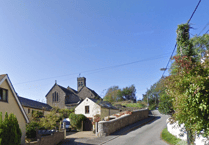A proposed 16.3 per cent council tax increase in Pembrokeshire could see the council failing to set a budget for the next financial year, the county’s main opposition group has warned.
At the February meeting of the county council’s Cabinet, members backed a recommended council tax increase in Pembrokeshire of 16.3 per cent.

Making the case for the increase, Joshua Beynon, Labour County Councillor for Pembroke Dock said:
“In the news over the past few weeks there has been a discussion around council tax and Pembrokeshire’s plan (along with every other council in Wales) to increase council tax to fund essential services.
“If you ask anyone on the street if you want to pay more tax, the obvious answer is a resounding no. But, I’m going to make the case in this article as to why council tax should rise and the services we may lose for good if we don’t act now.
The funding gap currently stands at £31.9 million for the 2024/25 financial year, which is the largest funding gap in our history. Yes, every organisation has some waste where savings can be made but I can tell you as an elected member for seven years that it is not remotely close to the tune of £28.4 million.”
Why has this happened? Joshua says it’s down to a number of factors:
“We are in an extended period where central government funding is in decline. Each year, the percentage of revenue paid for by council tax increases and the finance from the government goes down, there is no sign of that reversing. Before we’ve decided what to spend the rest of the money on, 70% of our funding goes on schools and social care.
“We have the lowest council tax in Wales,” he pointed out, “and this complicates the situation given that our main source of income is the Revenue Support Grant from the Government (RSG). The level of grant is… based on a calculation of what each local authority needs to spend to deliver a standard level of service at a common rate of council tax.”
“If you are below the average, you have a bigger gap to fund yourselves to make up the shortfall,” he said.
“It's very easy to be a politician and say we are going to reduce taxes, make your life better and improve services but that is not possible given the situation we find ourselves in after poor historical decisions and 14 years of austerity. Not increasing council tax results in gigantic job loses in our schools, the potential closure of leisure centre facilities and the failure to meet some statutory services such as those provided through social services to the most vulnerable in our society.
“As of today, council tax accounts for 26.05% of the Council’s general funding,” said Cllr Josh Beynon, who explained that 10 years ago council tax accounted for only 18.4%. Highlighting demand figures of £9.6 million for children’s social care, £4 million for the living wage increase and £5.1 million on adult social care, he added that there are extra pressures within adult social care and out of county placements.
“Children’s services are due to overspend their budget by £3.929 million due to the complexity of clients along with demand and increased care costs. For example, the budget for out of county placements was for 18 in 2023-24 and this is now at 32 people.
“Councillors claiming they will advocate for lower rises and better services are lying to you. It’s either throwing the most vulnerable in society under a bus or raising council tax to protect these services.”
Joshua took issue with those who accuse all councillors of using the money to pay extra wages, which are set by an independent national panel, and claim that they drive fancy cars (no car is included) and get freebies.
“I was given Welsh cakes once by a constituent,” he quipped, pointedly. “I got into this at 19 years old after growing up and always living here in wanting to make Pembrokeshire a better place. Pembrokeshire County Council did make historic mistakes but I want to see the best services for the future and the best opportunities, not a society where we provide the bare minimum.“
“The next time your local councillor says they are against a council tax rise, ask them what services they want to cut from your local community?“
The proposed increase, which will be decided by full council at its March 7 meeting, would see the basic council tax level – before town/community precepts and the police precept are included – rise by £219.02 for the average Band D property, taking it to £1,561.98.
It is expected to be the highest percentage rate in Wales, on top of previous increases of 12.5 per cent, 9.92 per cent, five per cent, 3.75 per cent, five per cent and 7.5 per cent.
Councillor Huw Murphy, on behalf of the independent group on Pembrokeshire County Council says a similar 16.3 per cent rate is also being proposed for the 2025-26 to 2027-28 financial years, despite a proposal at the February 2023 Cabinet, ahead of that year’s budget, to increase the rate by 7.5 per cent annually.
In a letter to Cabinet Member for Corporate Finance Cllr Alec Cormack, Cllr Murphy says that 16.3 per cent annual increase would lead, over the following years, to future basic Band D rates of £1,816.60, £2,112.89, and £2,457.50.
He adds: “The need to consider imposing a higher than 7.5 per cent council tax for 2024/25 will be debated and voted upon on March 7. However, I currently see no justification to also recommend a 16.31 per cent council tax rise for the following three years.
“If we go down this path, I foresee significant community tension and disengagement between residents and PCC, and a brief glance at social media over the last week will confirm this.”
Cllr Cormack responded by saying the 16.3 per cent increase is for the 2024-25 budget only, with increases for the remainder of the medium-term financial plan not discussed at the Cabinet meeting, modelling instead based on the 7.5 per cent figure.
“The 16.3 per cent increase in council tax for 2024-25 is necessary to achieve a sustainable budget throughout the Medium Term Financial Plan,” said Cllr Cormack.
“I will also point out that it is the joint responsibility of all 60 Councillors to set a balanced budget on March 7.”
Meanwhile, in Carmarthenshire, a council tax rise of 7.5 per cent looks ever more likely after the council’s cabinet agreed a final set of budget measures for 2024-25.
The rise would would mean a Band D householder paying £1602.80 – although this excludes the Dyfed-Powys Police precept.
Carmarthenshire Council Cabinet members said the rise, which follows a 6.8 per cent council tax rise at the start of the current financial year last April, – was higher than anyone wanted but that it was lower than the increase proposed by a number of other councils in Wales.





Comments
This article has no comments yet. Be the first to leave a comment.